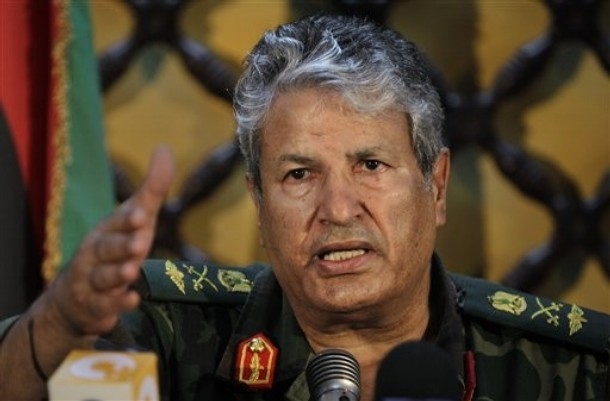Libya’s Haftar orders investigation into killing of Abdulfattah Yones

Eastern Libyan authorities have resumed an investigation into the unexplained killing of a rebel commander in the 2011 uprising that toppled Muammar Gaddafi, a case that could reopen old wounds.
The killing of Abdel Fattah Younes by suspected fellow fighters caused deep rifts within the rebel camp of the kind that have marked the turmoil and violence gripping Libya ever since.
Haftar ordered the eastern military prosecutor to “immediately and urgently reopen the investigation” of the killing of Younes and two others, according to a decree posted on Monday.
A court later dropped the case against Essawi and other suspects. But he resurfaced when Tripoli-based Prime Minister Fayez al-Serraj appointed him as economy minister this month.
Serraj met Essawi on Tuesday to discuss economic reforms, the government said, publishing pictures of both men.
His appointment has drawn an angry reaction in the east. Younes’s Obeidat tribe and a second eastern-based tribe warned in comments published in local media that the move was a provocation.
Both tribes are among the most powerful in the east and allied to Haftar, who has conquered most of eastern Libya.
The United Nations has been trying to mediate between east and west to prepare the North African country for elections.
France had been pushing for the vote in December but recent fighting between rival groups in Tripoli and a lack of a constitutional basis has dimmed the prospect.
Younes was for years part of Gaddafi’s inner circle. He defected at the start of the uprising in February 2011 and became the military chief of the rebellion.
His death exposed tensions between Islamists – whom Gaddafi suppressed during his 42-year dictatorship – and more secular and army figures.
“Younes’s assassination revealed a darker undertow to Libya’s uprising,” said Mary Fitzgerald, a Libya researcher. “Many Libyans say it almost destroyed their revolution. Of the many unresolved killings in Libya since 2011, the case of Younes casts a particularly long shadow because of who he was and what he represented.”
How to submit an Op-Ed: Libyan Express accepts opinion articles on a wide range of topics. Submissions may be sent to oped@libyanexpress.com. Please include ‘Op-Ed’ in the subject line.
- Dbeibah’s direct challenge to Trump at Davos - January 23, 2025
- HoR speaker, UN envoy meet on unity push - January 21, 2025
- New Oil Well Bolsters Libya’s Production Capacity - January 21, 2025


